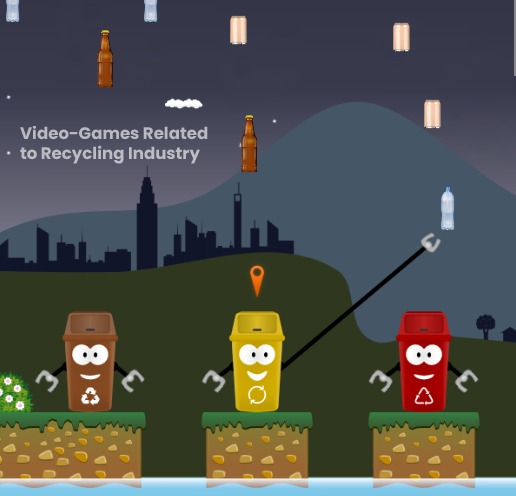
Video-Games Related to Recycling Industry
The majority of games is played online and necessitates extensive data usage, adding to “internet pollution,” which accounts for nearly 3.7 percent of global greenhouse gas emissions. The video game business is booming. There were 2.69 billion gamers on the planet at the end of 2020.
We have been experiencing the impact of climate change in real-time for decades. Since the late 1800s, the average temperature of the earth has risen by roughly 2.12 degrees Fahrenheit, according to NASA. Since 1969, the ocean has warmed by over 0.6 degrees Fahrenheit. Between 1993 and 2019, the ice sheets lost an average of 279 billion tonnes of ice per year. In the last century, the global average sea level rose nearly eight inches. “It is undeniable that human activity has warmed the atmosphere, oceans, and land,” the United Nations said in a gloomy Intergovernmental Panel on Climate Change report released in 2021. And because of its reliance on computation, servers, manufacturing, distribution, and other technologies, our entertainment production involves practically all parts of the game industry.
Developing environment friendly games:
Since it requires both technical expertise and creativity, game design is a particularly challenging area of software development to master. The students wanted to show kids that recycling is easy and pleasurable by encouraging in-game behaviors that could lead to players recycling outside of the game. Team Ifrit Salsa consisted of PhD candidate Daniel Biediger, undergraduates Alaa Gharandoq, Jesus Hernandez, and Arifur Sabeth, who qualified with their game RoboRecycler. The team’s adviser is Chang Yun, a computer science instructor. A robot for recycling was the inspiration for the video game RoboRecycler. Players command a robot with a claw and a poker that gathers paper, glass, plastic, and metal before classifying each type of material into the appropriate container. Gamers must utilize strategy to maximize their point totals because the point values and easiness of obtaining the recyclable items fluctuate. Up to four players compete to gather the most trash on each stage’s unique setting, which may be a park or a beach.
Spreading awareness
Environmental video games, according to a UN assessment, could be the next stage in raising environmental consciousness. Around 2.6 billion people, or one-third of the global population, play video games. In addition, the sector generates about $140 billion (€116 billion) in annual revenue, which is more than Bollywood, Hollywood, and recorded music sales combined. Technology has been used to transfer knowledge for decades; one method that has been shown to have positive learning effects is the use of digital games.
Recycling parts:
The circuit board, plastic case, and game discs are all recyclable pieces of game consoles. Hazardous metals can escape into the environment when video gaming consoles are abandoned. Football Manager’s developer, Sports Interactive, decided two years ago to embody the change it wanted to see in the world and ceased selling the game in plastic packaging altogether. “We are replacing the plastic box that is typically used across the industry with a reinforced, 100% recycled gatefold cardboard sleeve, made with 100% recycled fibres,” the company’s chief executive, Miles Jacobson, said at the time: “We’ve changed the printing on the packaging to vegetable and water-based ink with a recycled paper manual inside and have managed to source recyclable shrink wrap to encase the packaging and keep it secure on its travels.”
Energy consumption:
The PC version has between 10 and 20 million owners, according to SteamSpy, with an average total playing of 77 hours and a power demand of (let’s assume) 500W per user. That means the game used between 385GWh and 770GWh of electricity in its first six weeks on the market. It’s not just on PC: it’s also available on Xbox and PlayStation. For comparison, Hornsea One, the world’s largest offshore windfarm, can generate 1,200GWh of power over the same time period if the wind is blowing perfectly.
Lack of skills, personal effort, and storage space are all elements that influence this habit. To spread this knowledge and promote sorting and recycling, a variety of informational campaigns might be launched, but innovative approaches to teaching and spreading information about the topic should be used.
If you like this article you may also like; What are the Most Recyclable Materials?

